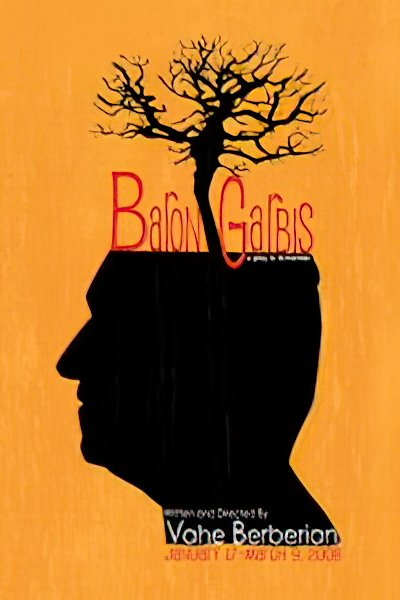Baron Garbis
Baron Garbis opened in Los Angeles in February 2008 with two alternating casts.
The play was never released on DVD, but you can watch it now on Youtube by clicking on the casts below.
Cast 1: Maurice Kouyoumdjian, Sako Berberian, Roupen Karakouzian
Cast 2: Ara Baghdoyan, Ara Madzounian, Christopher Bedian
Synopsis
Having been shaped and hardened in an Armenian ghetto, Baron Garbis is a rough-edged, aggressive man. His nation is his family, and he has stood like a sentry at the borders of that nation his entire life. By today’s standards, particularly those of the West, he is simply an incongruous, bizarre element that ruins the group portrait. But Baron Garbis must be viewed within the context of his own generation: a hardened, stubborn cohort that immediately followed the genocide and fought tooth and nail to survive as a collective.
In November of 2011, Baron Garbis also opened in Beirut, Lebanon. Performed in Armenian, with English subtitles, the production was directed by Souren Khedeshian.
Cast: Paul Misassian, Garen Darakjian and Sako Ohanian.
True to character, Baron Garbis almost forced me to write this play. Having been shaped and hardened in an Armenian ghetto, Baron Garbis is a rough-edged, aggressive man. His nation is his family, and he has stood as a sentry at the borders of that nation his entire life. By today’s standards, particularly those of the West, he is simply an incongruous, bizarre element that ruins the group portrait. But Baron Garbis must be viewed within the context of his own generation: a hardened, stubborn cohort that immediately followed the genocide and fought tooth and nail to survive as a collective.
Baron Garbis is probably the last of the “soldiers” of the Diaspora. His son Jirayr is a generation that’s already cultured, courteous, politically correct, and reconciled with Western concepts. It is a generation that has set aside the “gun” because Armenianness is more of a cerebral rather than physical, daily reality.
As for the generation of Jirayr’s son Khajag, it is nearly cut off from the past. In Khajag’s case, the sole link to that past is his grandfather. We confronted evidence pointing to this reality when we set out to stage this play. It took months to find a few 19-21-year-olds with sufficient ability to read and write Armenian who felt comfortable on stage.
We don’t want to view what is the natural course of our reality through Baron Garbis’s glowering spectacles, but there’s no doubt that, in order to survive, a certain tenacity and stubbornness are necessary. The plan to stage this play was perhaps just such an example of stubbornness. In that regard, I owe a great deal to my friend, actor Simon Abkarian of Paris, who participated in the exchange of ideas during the writing of this play and had valuable input. Moreover, I of course owe much to the actors, who during the rehearsals helped make the characters all the more convincing and real.
My intent with this play was not to answer questions but to present a faithful, condensed portrayal of one part of our reality and prompt some reflection. My hope is that we will succeed.
